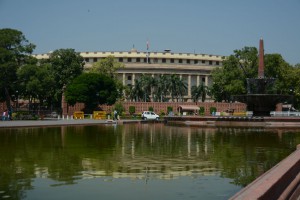The Lok Sabha passed the Scheduled Castes and the Scheduled Tribes (Prevention of Atrocities) Amendment Bill, 2014 which seeks to replace the Scheduled Castes and Scheduled Tribes (Prevention of Atrocities) Amendment Ordinance, 2014 and amend the provisions of the Scheduled Castes and the Scheduled Tribes (Prevention of Atrocities) Act, 1989. The bill was introduced in the Lok Sabha by the Social Justice and Empowerment Minister Mr. Thaawar Chand Gehlot on 16.7.2014.
The Bill amends certain existing categories of actions to be treated as offences against SCs and STs and adds some new categories of offences. The new categories of offences added by the Bill are garlanding with footwear, compelling to dispose or carry human or animal carcasses, or do manual scavenging, abusing SCs or STs by caste name in public attempting to promote feelings of ill-will against SCs or STs or disrespecting any deceased person held in high esteem, and imposing or threatening a social or economic boycott. Assaulting or sexually exploiting an SC/ST woman is already an offence under the 1989 Act. The Bill also makes punishable intentional touch to a SC/ST woman in sexual manner without her consent, use of words, acts or gestures of a sexual nature for a SC/ST woman, or dedicating a SC/ST woman as a devadasi to a temple, or any similar practice. The Bill also expands the offence of inducing SC/ST vote in a manner against law and explains the offence of wrongfully occupying the land belonging to SCs or STs by defining the term “wrongful” which was not defined in the 1989 Act. The Bill also adds a chapter on the rights of victims and witnesses.
A non SC or ST public servant who neglects his duties relating to SCs or STs can be punished with imprisonment for a term of six months to one year under the Act as it exists, the Bill specifies these duties, including, registering a complaint or FIR, reading out information given orally, before taking the signature of the informant and giving a copy of this information to the informant, etc. Another important amendment is that where under the existing Act a Court of Session at the district level is deemed a Special Court to provide speedy trials for offences and a Special Public Prosecutor is appointed to conduct cases in this court. The Bill substitutes this provision and specifies that an Exclusive Special Court must be established at the district level, and in a district with fewer cases a Special Court, to try offences under the Bill. It is also provided that cases under this Bill must be disposed within two months and the appeals shall lie to High Courts which must be disposed within three months.
– Lok Sabha

